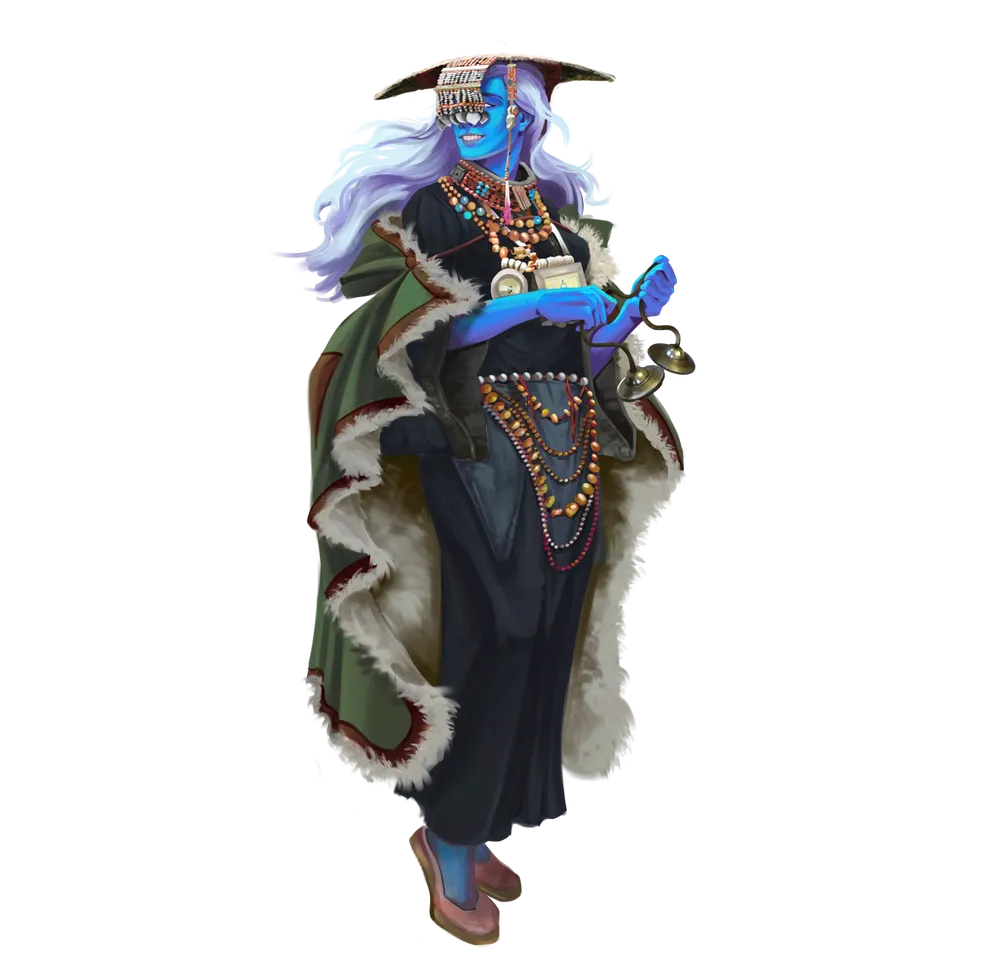
Samsaran
 Uncommon Humanoid Samsaran Source Tian Xia Character Guide pg. 53Blue-skinned people native to Zi Ha, who reincarnate upon death and recall pieces of their past lives. They are common in Zi Ha, Po Li, and Goka.
Uncommon Humanoid Samsaran Source Tian Xia Character Guide pg. 53Blue-skinned people native to Zi Ha, who reincarnate upon death and recall pieces of their past lives. They are common in Zi Ha, Po Li, and Goka.Samsarans, as the tale goes, originated with a group of scholars in Zi Ha who ventured into the mountains to find the cure for an illness ravaging their village. After weeks of peril, they found a freshwater spring filled with pure magical life essence. This water brought the scholars back from the brink of death and cured the villagers. Given a new chance at life, everyone who drank the water devoted the rest of their life to learning and experiencing the world fully. Upon death, this devotion, combined with the magical essence now infused in their bodies, transformed these people into the first samsarans.
Samsarans dedicate themselves to achieving enlightenment—a true understanding of everything and everyone in the world around and beyond them. Unlike duskwalkers, samsarans reincarnate many times over, with some accumulating thousands of lived lives. This cycle of reincarnation continues until the individual samsaran achieves this goal of enlightenment, or irrevocably fails at making any progress toward it. At that time, a samsaran's soul passes onto the Great Beyond, and their body melts into pure water. For those samsarans who succeeded at enlightenment, they find a time of peace and satisfaction in the afterlife. Those who have failed instead encounter an afterlife filled with misery, punishment, reminders of past failure, or in extreme cases, nothing, leaving the souls to waste away for the rest of time.
While samsarans can recall parts of their past incarnations, these recollections often feel like halfremembered dreams. By combining these snippets of memories from the past with new knowledge from their current life span, samsarans can view and connect with the world in entirely unique ways. The detachment that comes with countless lifetimes sometimes makes it difficult for samsarans to empathize and connect with others, however.
If you want to play a character who experiences a repeated cycle of existence, seeking out new knowledge and experiences as you walk a path to learning everything you can about the universe, you should play a samsaran.
You Might...
- Be single-minded toward a goal to complete the next step of your enlightenment.
- Have a deep sense of curiosity for other people and their perspectives.
- Take things at a slower pace, putting things off until the next cycle of reincarnation.
Others Probably...
- Think that you're very knowledgeable and wise.
- Assume that you're deeply spiritual and detached from worldly matters.
- Consider you immortal and envy your ability to reincarnate.
Physical Description
Samsarans reflect the diversity of whatever ancestry they had in their first mortal life cycle, and only upon their first rebirth do they take on the unique features of their kind. The reincarnation cycle gives samsarans blue skin tones, often in a pale shade but ranging to the deepest midnight navy as well. They have pupilless eyes that are typically pallid in coloration, comparable to the moon. Samsarans also have transparent and colorless blood, resembling crystal clear water.
When samsarans die, they reincarnate as a baby born to a humanoid couple of non-samsaran ancestry, often in the area a particular samsaran held the most affinity for in their previous life cycle. While they might share some features with their previous incarnation, the similarity is more like the shared appearances between a parent and child rather than identical duplication. Samsarans age at the same rate as humans, and unless they succumb to unnatural causes of death, they die of old age at 100 years old. Children born to samsarans live their first life cycle as the mortal ancestry their parents had and will take on the unique skin color and eyes of other samsarans only after their first death.
Society
The ultimate goal for samsarans is to reach enlightenment, but there's no singular path to walk or prescribed way to do so. Rather, each samsaran must explore the universe and learn its many secrets in their own way. Some samsarans find their way into schools, where they study niche research topics for decades at a time. Others act in the service of different gods, each religion offering them guidance to understanding the universe. Many enter periods of long internal reflection, isolating themselves from the outside world, while a handful venture out into the world to experience everything firsthand. From one incarnation to another, a samsaran can also switch up their path, pursuing a new avenue of knowledge and experience than they'd done for the last few centuries.
Even with the independent nature of the path to enlightenment, samsarans don't necessarily go through their journeys alone. Samsarans value community as spaces to share knowledge, find support and safety, and establish a connection with similarly minded people. Samsaran communities are often tightly knit, and their enclaves small. With a focus on knowledge and connection to the world, these samsaran enclaves typically occur in schools and temples. Trusted non-samsarans are invited into these communities to share their expertise and to learn from the collective knowledge of samsarans in different stages of the enlightenment journey. Conflicting perspectives and experiences are welcome, with samsarans encouraged to talk through differences to come to a better combined understanding.
When samsarans travel outside of their enclaves, they often live nomadically until they find something they want to study. If their journey takes them to a non-samsaran community, they might spend several cycles learning and experiencing life within that community, lending their knowledge to the people there and becoming a member until the call of enlightenment leads them away.
Rarely do samsarans have children, but when they do, the child isn't born a samsaran. Rather, the child bears the ancestry of their parents before they too reincarnated into samsarans, such as a human child born to samsarans who were human in their first life. Thus, it's tradition for children of samsaran lineage who haven't gone through their first rebirth to be adopted by non- samsaran communities and experience a fully mortal life. This practice isn't done out of cruelty or neglect; most samsarans believe that spending this first lifetime among one's kin is a fundamental element that can never be properly experienced after reincarnation. Some samsarans do choose to raise their children themselves, but they usually keep members of their child's ancestry as close friends to maintain the important connection in this first lifetime. Regardless of their upbringing, once the child dies and reincarnates for the first time, their parents will traditionally bring the child into a samsaran community to begin their path to enlightenment.
While a core part of a samsaran's identity is preserved in the reincarnation cycle, their gender, appearance, and perspectives change from incarnation to incarnation. Even with memories shared between life cycles, when a samsaran is reborn, they're treated as a different individual than their previous incarnations.
For samsarans, the journey is the destination, so they don't rush through their lifetimes trying to reach enlightenment as quickly as possible. Every incarnation, a samsaran usually focuses on a goal that will further their understanding of the world. However, if the goal isn't accomplished in one lifetime, it gets carried over into the next reincarnation cycle, with some goals lasting several hundred years. The blending of lifetimes combined with the fact that the reincarnation cycle continues indefinitely until enlightenment is achieved—or failed—gives samsarans a skewed sense of time. With as many lifetimes as they could possibly need to accomplish or undo anything they want, urgency isn't a common concept for samsarans.
Samsaran names are shaped both by their previous incarnations and their present one. Their first names are given to them by the parents who raised them in their current life cycle and therefore reflect the region and culture where they're reborn. Upon reaching adulthood, samsarans give themselves a second name that reflects what they learned in their previous incarnation or represents their goal for this life cycle, such as virtues they hope to embody or concepts they wish to better understand. Most samsarans don't use traditional surnames, but if they wish to have one, they often combine the names from their last two incarnations.
Beliefs
With their lives centered around seeking enlightenment and the laws of the reincarnation cycle, many samsarans tend toward structure and order, tempered by compassion and empathy drawn from existences spent in a variety of bodies. A samsaran's beliefs can also change between incarnations, with the experiences of the previous lifetime impacting their worldviews in the current one.
Many samsarans are drawn toward religion and deities, which provide community and a framework to understanding the world that helps guide their path to enlightenment. With each samsaran's path being so independently unique, samsarans might follow any of a wide variety of gods in any given lifetime. However, Tsukiyo is often cited as the patron god of samsarans since many samsarans feel kinship toward his own tale of rebirth and the eternal cycle of the moon. Some tales even suggest that Tsukiyo had blessed the magical springs the first samsarans drank from.
Popular Edicts achieve greater self-understanding, find your personal path toward enlightenment, take your time on journeys
Popular Anathema live without intention or purpose, prevent others from genuine attempts at learning, stagnate in thought or passion
Names
Altuin Nurture, Davare Clarity, Enkhma Defense, Jochi Spellcrafter, Narintya Softheart, Sarange Lawseeker
Samsaran Mechanics
Hit Points
8
Size
Medium
Speed
25 feet
Attribute Boosts
Constitution
Wisdom
Free
Attribute Flaw
Charisma
Languages
CommonSamsaranAdditional languages equal to your Intelligence modifier (if it's positive). Choose from
Chthonian,
Diabolic,
Draconian,
Empyreal,
Jotun,
Petran,
Pyric,
Sussuran,
Thalassic, and any other languages to which you have access (such as the languages prevalent in your region).
Cryptomnesia
You retain bits of knowledge from your former lives. You gain a +1 circumstance bonus to untrained skill checks.
Low-Light Vision
You can see in
dim light as though it were
bright light, so you ignore the
concealed condition due to dim light.
Wanderer's Soul
Your soul is especially able to return to the cycle of reincarnation. When you're the subject of
raise dead,
reincarnate, or a similar ritual that would return you to life, the primary caster uses the outcome one degree of success better than their roll. You always return to life as a samsaran, even if the ritual would reincarnate you into a body of a different ancestry.
 Licenses
Sources
Licenses
Sources
 Contact Us
Contributors
Support the Archives
Maximize Menu
Contact Us
Contributors
Support the Archives
Maximize Menu
 Licenses
Sources
Licenses
Sources
 Contact Us
Contributors
Support the Archives
Contact Us
Contributors
Support the Archives











